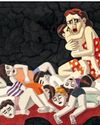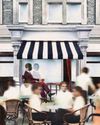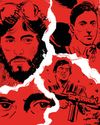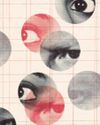LOU ORTENZIO WAS A TRUSTED WEST VIRGINIA DOCTOR WHO GOT HIS PATIENTS—AND HIMSELF—HOOKED ON OPIOIDS. NOW HE’S TRYING TO RESCUE HIS COMMUNITY FROM AN EPIDEMIC HE HELPED START.

WELL PAST SEVEN one evening in 1988, after the nurses and the office manager had gone home, as he prepared to see the last of his patients and return some phone calls, Dr. Lou Ortenzio stopped by the cupboard where the drug samples were kept.
Ortenzio, a 35-year-old family practitioner in Clarksburg, West Virginia, reached for a box of extra-strength Vicodin. The box contained 20 pills, wrapped in foil. Each pill combined 750 milligrams of acetaminophen, the active ingredient in Tylenol, with 7.5 milligrams of hydrocodone, an opioid painkiller.
Ortenzio routinely saw patients long after normal office hours ended. Attempting to keep up with the workload on this day, he had grown weary and was suffering from a tension headache; he needed something to keep him going. He unwrapped a pill, a sample left by a drug-company sales rep, certain that no one would ever know he’d taken it. Ortenzio popped the pill in his mouth.
“It was a feeling like I’d never felt before,” he told me recently. “I’m tense and nervous, and that anxiety is crippling.” The pill took the anxiety away. The sense of well-being lasted for four hours, carrying him through the rest of the night’s work.
Back then, Ortenzio was one of Clarksburg’s most beloved physicians, the kind of doctor other doctors sent their own families to see. His patients called him “Doc O.” He made time to listen to them as they poured out the details of their lives. “To me, he wasn’t like a doctor; he was more like a big brother, somebody I could talk to when I couldn’t talk to anybody else,” says Phyllis Mills, whose family was among Ortenzio’s first patients. When Mills’s son was born with a viral brain infection and transferred to a hospital in Morgantown, 40 miles away, Ortenzio called often to check on the infant. Mills never forgot that.
この記事は The Atlantic の May 2019 版に掲載されています。
7 日間の Magzter GOLD 無料トライアルを開始して、何千もの厳選されたプレミアム ストーリー、9,000 以上の雑誌や新聞にアクセスしてください。
すでに購読者です ? サインイン
この記事は The Atlantic の May 2019 版に掲載されています。
7 日間の Magzter GOLD 無料トライアルを開始して、何千もの厳選されたプレミアム ストーリー、9,000 以上の雑誌や新聞にアクセスしてください。
すでに購読者です? サインイン

Catching the Carjackers - On the road with an elite police unit as it combats a crime wave
On August 7, 2022, Shantise Summers arrived home from a night out with friends around 2:40 a.m. As she walked from her car toward her apartment in Oxon Hill, a Maryland neighborhood just southeast of Washington, D.C., she heard footsteps behind her. She turned and saw two men in ski masks. One put a gun to her face; she could feel the metal pressing against her chin. He demanded her phone, wallet, keys, and Apple Watch. She quickly handed them over, and they drove off in her 2019 Honda Accord.

The Most Remote Place in the World - Point Nemo is Earth's official "middle of nowhere." A lot seems to be going on there.
It’s called the “longest-swim problem”: If you had to drop someone at the place in the ocean farthest from any speck of land—the remotest spot on Earth—where would that place be? The answer, proposed only a few decades ago, is a location in the South Pacific with the coordinates 48 52.5291ᤩS 123 23.5116ᤩW: the “oceanic point of inaccessibility,” to use the formal name. It doesn’t get many visitors. But one morning last year, I met several people who had just come from there.

You Are Going to Die - Oliver Burkeman has become an unlikely self-help guru by reminding everyone of their mortality.
"The average human lifespan," Oliver Burkeman begins his 2021 megabest seller, Four Thousand Weeks: Time Management for Mortals, "is absurdly, terrifyingly, insultingly short." In that relatively brief period, he does not want you to maximize your output at work or optimize your leisure activities for supreme enjoyment. He does not want you to wake up at 5 a.m. or block out your schedule in a strictly labeled timeline.

Washington's Nightmare - Donald Trump is the tyrant the first president feared.
Last November, during a symposium at Mount Vernon on democracy, John Kelly, the retired Marine Corps general who served as Donald Trump's second chief of staff, spoke about George Washington's historic accomplishments— his leadership and victory in the Revolutionary War, his vision of what an American president should be. And then Kelly offered a simple, three-word summary of Washington's most important contribution to the nation he liberated.

The Elite College Students Who Can't Read Books - To read a book in college, it helps to have read a book in high school.
Nicholas Dames has taught Literature Humanities, Columbia University's required greatbooks course, since 1988. He loves the job, but it has changed. Over the past decade, students have become overwhelmed by the reading, College kids have never read everything they're assigned, of course, but this feels different. Dames's students now seem bewildered by the thought of finishing multiple books a semester. His colleagues have noticed the same problem.

What Zoya Sees
Long a fearless critic of Israeli society, since October 7 Zoya Cherkassky-Nnadi has made wrenching portraits of her nation's sufferingand become a target of protest.

Malcolm Gladwell, Meet Mark Zuckerberg
The writer’ insistence on ignoring the web is an even bigger blind spot today than it was when The Tipping Point came out.

Alan Hollinghurst's Lost England
In his new novel, the present isnt much better than the past—and its a lot less sexy.

Scent of a Man
In a new memoir, Al Pacino promises to reveal the person behind the actor. But is he holding something back?

THE RIGHT-WING PLAN TO MAKE EVERYONE AN INFORMANT
In Texas and elsewhere, new laws and policies have encouraged neighbors to report neighbors to the government.